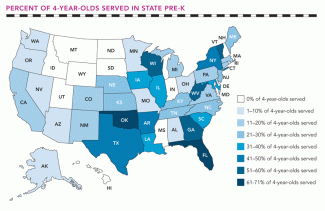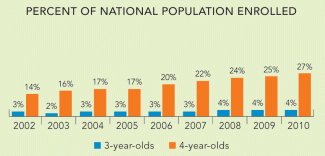
Preschool Access
With Tough Budget Choices Ahead, Will Enrollment Stagnate?
June 17, 2011
DIGGING DEEPER: WHAT THE YEARBOOK HAS TO SAY ABOUT ENROLLMENT
(PART 1 OF 3-PART SERIES)
In our annual report of state-funded preschool programs, we examine three key features of each state pre-K initiative: access, quality standards, and resources. Here we provide a big picture look at the first of these three features, access, in an effort to analyze the nation’s commitment to providing preschool education at the state level.
As we saw in The State of Preschool 2010, state-funded prekindergarten enrollment increased slightly for the 2009-2010 school year, continuing the trend of slow growth in access to state pre-K across the country seen over the last two years. State-funded pre-K served 1,292,310 children in 52 programs in 40 states during the 2009-2010 school year, including 1,283,890 3- and 4-year-olds. The percentage of children enrolled in such programs varies widely by state (see Figure 1 below).

During the 2009-2010 school year, 4-year-old enrollment increased by only 3.8 percent nationally while access for 3-year-olds decreased by 3.2 percent. This is in sharp contrast to the years before the recession when enrollment for both ages grew steadily each year. We anticipate that growth in access to state-funded pre-K will be no better in the 2010-2011 school year, especially considering that several programs have already been eliminated entirely or are being considered for termination or serious cuts to funding. Figure 2 shows the changes in percent of children enrolled in state-funded pre-K over time.

Other key findings regarding access for the 2009-2010 school year include:
• Nearly 27 percent of 4-year-olds and almost 4 percent of 3-year-olds were served in 40 states, reflecting a one percentage point increase in 4-year-olds and stagnation for 3-year-olds.
• In the 2009-2010 school year, 26 states increased the enrollment of 4-year-olds, down from 31 states in the 2008-2009 school year. In addition, new pilot programs in Alaska and Rhode Island serve only 4-year-olds.
• Ten states decreased their enrollment of 4-year-olds in the 2009-2010 school year, although three of these states increased their enrollment of 3-year-olds.
• Oklahoma continues to serve the largest percentage of 4-year-olds at 71 percent, followed closely by Florida at 68 percent. These two states, along with West Virginia (55 percent), Georgia (55 percent), Vermont (52 percent) and Wisconsin (52 percent), are the only ones to serve more than half of their 4-year-olds in state pre-K programs.
• Enrollment for 3-year-olds decreased by more than 4,000 children nationwide. Illinois, New Jersey, and Vermont were the only states to serve more than 15 percent of their 3-year-olds in state pre-K. California, Nebraska, and Kentucky all served approximately 10 percent of their 3-year-olds.
• Overall, including special education and Head Start, enrollment increased by 1.4 percentage points for 4-year-olds while enrollment of 3-year-olds rose by only 0.4 percentage points.
As we note above, while there was some improvement in the number of children enrolled in state-fund preschool programs across the nation, the rate of growth has slowed considerably since the recession hit. Many states working towards the goal of universal access have had to put their plans on hold as funding levels hang in the balance. Some programs that enroll children in low-income families have been faced with a double-whammy this year: as unemployment persists, more families meet the income requirements for pre-K, but the programs do not have funding to enroll all eligible children. Enrollment and funding are inherently intertwined, and many programs have had to choose between increasing enrollment for those who can benefit versus allocating funds to improve program quality for a smaller number of students. These are difficult choices for all stakeholders, and ones that must be carefully considered and debated as public finance troubles persist.
– Jen Fitzgerald, Public Information Officer, NIEER
– Megan Carolan, Policy Research Coordinator, NIEER
About NIEER
The National Institute for Early Education Research (NIEER) at the Graduate School of Education, Rutgers University, New Brunswick, NJ, conducts and disseminates independent research and analysis to inform early childhood education policy.
